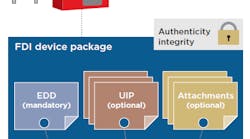What if you could bring a United Nations translator to any country? You could talk to anyone, communicate exactly what you want, and understand them perfectly, too. Pretty sweet.
Well, that's what the FieldComm Group's Field Device Integration (FDI) specification does for field devices, host systems and controllers. FDI takes previously inaccessible data from them that was unusable outside their original protocol, and turns it into commonly reported and displayed information.
FDI combines standard electronic device description language (EDDL) software and elements of field device tool (FDT) software, which are both host-resident technologies. This is a significant development that was a long time coming, and it's thanks to an epic level of collaboration, years of contributed labor and financial support by former FDI Cooperation LLC and FieldComm member organizations, partners, developers, suppliers and individuals.
"FDI improves interoperability between field devices and host systems through FDI Packages," says Achim Laubenstein, FDI technology director at the FieldComm Group and manager of fieldbus standardization at ABB. FDI Packages include everything a host system needs for consistent device visualization and parameterization across platforms (Figure 1). "FDI's big advantage is it replaces platform-dependent integration solutions, and makes device drivers interoperable with host systems because their device descriptions are harmonized across protocols and systems," Laubenstein says.
Figure 1: The core of the FDI Specification is the FDI Package, which is equivalent to a field device’s organizational structure at its software level. It contains all the files a host system needs to talk to the device, such as electronic device descriptions (EDDs), user interface plug-ins (UIPs), attachments and security certificates.
Martin Zielinski, chairman of the FieldComm Group's Strategic Technology Committee and director of HART and Foundation Fieldbus technology at Emerson Process Management, adds, "The high-level recognition was that the process industries have multiple protocols that will continue to exist, but now each can deliver data to different host systems in the same way, and transform it into useful information. FDI takes a bucket of bits, transforms it, and puts it on display for users."
Collaboration aids combination
To address needs expressed by users and recommendations from user-associations like NAMUR and WIB, several fieldbus organizations began efforts to overcome the barriers between their protocols by forming the FDI Cooperation LLC about six years ago.
The founding members included the Fieldbus Foundation and HART Communication Foundation, which recently joined forces as the FieldComm Group, along with PROFIBUS and PROFINET International, FDT Group and OPC Foundation. Suppliers supporting the effort with personnel and funding included ABB, Emerson Process Management, Endress+Hauser, Honeywell Process Solutions, Invensys (now part of Schneider Electric), Siemens and Yokogawa Electric Corp.
How FDI works
Published as the IEC 62769 standard, the FDI Specification is available from all four owner organizations, including FieldComm Group, PI, FDT Group and the OPC Foundation. "We had cooperation on this six-year project that I think is unprecedented in the process industries," says Zielinski. "We looked at EDDL and FDT, and came up with a new form that has the best of both."
Because EDDL is a text-based language that's independent of the operating system, Zielinski explains, it's limited in its ability to display and execute diagnostics, so about 10% of the time, it needs an added software application in the operating system.
"For example, text-based EDDL is used to set up a device to measure multiple physical properties like flow, pressure and process temperature, but to calculate mass flow, its display needs parameters from a database, and this is what the added software application does," adds Zielinski. "FDI can do both text-based functions, and then display parameters like mass flow because it combines EDDL and the software application that's a derivative of FDT."
Laubenstein adds that, "FDI is protocol-independent, in general, but information has to be mapped to protocol-specific syntaxes. This mapping is specified in protocol-specific annexes to the FDI specification. Currently, FDI supports Foundation Fieldbus (FF), HART and WirelessHART, PROFIBUS and PROFINET. ISA100.11a is under preparation, and FDI has also specified mechanisms—so-called gateway packages—that allow data mapping between different communication protocols.
"Consequently, vendors provide a device package, which is a virtual representation of their device, and provide all information needed by a host system. By running the package, a host system provides all the device functionality to the user, such as parameterization, diagnosis and maintenance. FDI Package allows added device data to be accessed through one device package—one set of DDLs for all tools—but run on each host system. With FDI, the end users get access to their valuable device information."
Do-it-yourself packages
To allow device manufacturers to build their own FDI Packages for use on their host systems, the FDI Cooperation team also developed the FDI Package Integrated Development Environment (IDE), which lets suppliers write and test packages for their specific devices, as well as develop common, host-component software (Figure 2). For instance, FDI Common Host Components help system manufacturers implement FDI into their systems, and ensure interoperability among device packages.
Figure 2: FDI Package Integrated Development Environment (IDE) provides all the tools needed to write, run and test FDI Packages for devices running Foundation Fieldbus, HART, Profibus and Profinet. IDE supports EDD editing and tokenizing into one encoded file format. Encoded EDDs, UIPs and attachments are combined to form an FDI Package by the FDI Package IDE.
"FDI can be viewed as a translator, but so far, it's only for HART, FF, PROFIBUS or PROFINET. The advantage for end users is that FDI is independent of the physical hardware and software that's required for each protocol," adds Zielinski. "Now, users can pick any host and supplier they want, and use any field device they want, as long as they're FDI-compatible. Users wanted a single integration technology, and that's what we're delivering."Current, UPCOMING events
The first release of FDI technology was FDI 1.0 in January 2015, which included its online capability that requires devices to be physically present when setting them up for integration into a system. The second release was FDI 1.1 in July 2015, which included its offline capability that doesn't require devices to be physically present.
"The offline capability is key, especially for users on new projects, because it allows them to do configuration without the field devices present," says Zielinski. "This means they can do different HART, FF, PROFIBUS and PROFINET configurations before they get to the site, and do a bulk download when they get there, which will save a lot of time."
With its core mission accomplished, FDI Cooperation's members decided to dissolve it on July 28, and transfer its technology and intellectual property to the FieldComm Group, which will serve as co-owner with PI, FDT Group and the OPC Foundation. As part of this collective ownership, these organizations are contractually required to maintain the FDI specification, including its language and rules. FieldComm Group and PI are assigned to maintain FDI's tools, including FDI Package IDE and host-component software.
However, even though the cooperation organization is gone, updates to FDI are continuing and further innovations are already underway. For instance, FieldComm Group released on Aug. 19 the first update to its development tools. FDI Package IDE, Version 1.1, and FDI Common Host Components, Version 1.1, consist of new capabilities for FDI product developers, including an automated device package test tool, support for Profinet-based device packages, and support for developing device packages capable of offline configuration, including upload and download features.
In fact, the first two FDI-based solutions have already been released. The first is ABB's Field Information Manager (FIM), which is a freely downloadable tool for parameterization and visualization. FIM can be used to help configure some of the hundreds of parameters used to assign field devices to do different jobs in their applications.
The second FDI solution is CodeWrights' iDTM-FDI Manufacturer Edition (ME) for device manufacturers, which combines FDI Common Host Components and FDT2 DTM Common Components to link the two new standards, help users cope with FDI packages in FDT applications, assist device-specific DTM development, and minimize driver development and testing.




